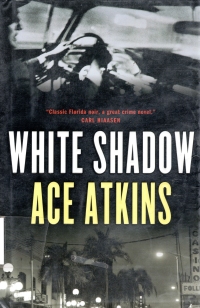 I got this book from the library based on Atkins’ strong turn in the Spenser novel Lullaby. This book was not bad enough for me to swear off Atkins’ other books, but it’s not a very good book. Or, at least, it’s not a book enjoyed very much.
I got this book from the library based on Atkins’ strong turn in the Spenser novel Lullaby. This book was not bad enough for me to swear off Atkins’ other books, but it’s not a very good book. Or, at least, it’s not a book enjoyed very much.
The book is a fictionalized account of the murder of an early twentieth century Tampa underworld figure named Charlie Wall in 1955. Atkins, a former newspaperman, was nominated for a Pulitzer based on some articles he did on the case, so he had a pile of research to novelize. And he did.
The book has two main characters, sort of: The first person narrator, a former newspaperman, tells the story as it happens but also from a double-effect narrator position in the present. Then, there’s a police detective, a relatively straight man on a corrupt police force, investigating the crime. But the narrative points of view don’t stop there. No, we also get segments of chapters from two other gangsters, Rivera and Trafficante, a Cuban woman on the run for stealing a ledger from Rivera, and an appearance by Fidel Castro, young revolutionary. You know, I recognize that the modern style is to hop points of view–I’ve done it myself–but this book jumps a number of times per character, and we end up with so many different points of view and characters that it’s hard to keep them straight. Especially since some of the lesser characters are not that well developed.
Okay, we’ve got that knock against it.
Secondly, the book is full of ugly flourishes included only for the grotesquerie. We have a little girl kicking the corpse of a man her father just gunned down until her father restrains her. We have the sodomy of a major character as a young boy because…. Because it was in Atkins’ notes, I guess. Some grungy adultery just for scenery. Bleakness and bleakness for no reason other than to emphasize the gritty noir.
Finally, we’ve got a plot about the murder of Charlie Wall and the maybe related search for his ledger which has–I dunno, the goods on his rivals, his secret accounts or something. It’s a side McGuffin, though, since the actual murderers aren’t after it, really, well, some maybe are. There’s no real justice for them, not in a satisfying end, and I’m pretty sure the first person narrator funds the Cuban revolution by giving the ledger to Castro at the end.
All in all, it’s punching above its weight as a crime novel, perhaps swinging for Great Novel, and it misses both.
I’ll try another Atkins book by and by, but I was disappointed with this one.
Books mentioned in this review:


